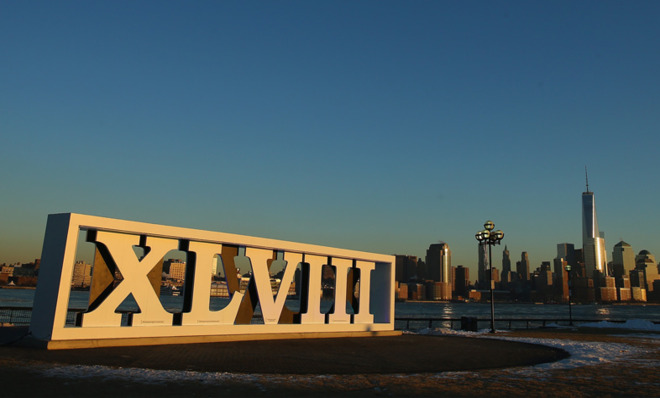Super Bowl Sunday is America's biggest religious holiday
A decline in formal religious participation makes this game the event of the year


A free daily email with the biggest news stories of the day – and the best features from TheWeek.com
You are now subscribed
Your newsletter sign-up was successful
Americans compare their love of football to religion so routinely that it's almost become a cliché. But it's easy to see why those comparisons are so common. Games are played on the Lord's Day. Devotion to both football and faith peak in the South and heartland. The game presents itself in themes that are deeply spiritual: Sacrifice and toil lead to glorious conquest and victory.
And the Super Bowl is this faith's high holy day, when even the most non-observant find themselves cramming in for the spectacle. Consider the different elements of the "event" — fighter jet flyovers, the national anthem, the game, the awards — which all neatly combine into a kind of liturgy. Buffalo wings, any food that can be plausibly grilled, beer — they all become a kind of festal offering. The only day on which more food is consumed in America is Thanksgiving. The winning player's declaration "I'm going to Disney World" stands in where "Mine Eyes Have Seen the Glory" might as the recessional hymn.
Writing in the Christian Century 30 years ago, Joseph L. Price said, "[T]here is a remarkable sense in which the Super Bowl functions as a major religious festival for American culture, for the event signals a convergence of sports, politics, and myth. Like festivals in ancient societies, which made no distinctions regarding the religious, political and sporting character of certain events, the Super Bowl succeeds in reuniting these now disparate dimensions of social life."
The Week
Escape your echo chamber. Get the facts behind the news, plus analysis from multiple perspectives.

Sign up for The Week's Free Newsletters
From our morning news briefing to a weekly Good News Newsletter, get the best of The Week delivered directly to your inbox.
From our morning news briefing to a weekly Good News Newsletter, get the best of The Week delivered directly to your inbox.
The athletes become demigods, of course. Their performance on the field of play is taken as an indication of "who they are" as figures in the history of the game itself. Tom Brady wins, so he is a winner. Peyton Manning has not won as much and so he may not be. There is no more religious an intuition than that liturgy literally reveals the truth. If Richard Sherman swats down another potential game-winning pass, the media practically expects him to offer "I am that I am" in the post-game interview.
Why are even the non-devout non-fans there for the game and the parties? The answers offered resemble religious tautologies: It's the Super Bowl. We are Americans. It's a tradition.
And why does the spectacle of the Super Bowl get bigger every year? Why are the food traditions getting more elaborate and well-articulated? Why is the broadcast reaching more and more people?
Perhaps the answer is because the "religious" aspect of football is a comforting substitute in a society of declining religious practice and social engagement. The number of people who never attend religious services has been rising steadily for two decades. It was almost 15 years ago that Robert Putnam revealed a steep and steadying decline in civic engagement. Although nearly 4 in 10 people say they go to a worship service regularly, the actual number is probably well less than half that.
A free daily email with the biggest news stories of the day – and the best features from TheWeek.com
I am not arguing that Americans have made the Super Bowl into their God, or that Americans are becoming less spiritual because of the entertainment industry. All the evidence is that a decline in formal religion doesn't mean a decline of "spirituality" generally.
But the communal and ritual aspects of religious and civic experience clearly are on the decline for many Americans. Yet Americans, like all humans, still yearn to occasionally be a part of a community or an action larger than themselves. And so the parts of American life that are accessible to nearly everyone and allow us to participate in an "Event" that others participate in as well become even more popular.
Live television events like awards shows have seen a boost in ratings over recent years, in part because of the second-screen phenomena, which transforms passive television viewing into a kind of interactive communal experience. Sports programming now dominates a fragmented television market, and the Super Bowl is the ultimate live event.
The invocation of luck and fortune in gambling, and the heroizing of athletes as near divine representations of the virtues, gives Super Bowl Sunday a quasi-religious feel. But it is the community parties, the enormous and elaborately fried feasts, and the felt-obligation to "be a part of it" that have made this Sunday into the most religious day in the American calendar.
Michael Brendan Dougherty is senior correspondent at TheWeek.com. He is the founder and editor of The Slurve, a newsletter about baseball. His work has appeared in The New York Times Magazine, ESPN Magazine, Slate and The American Conservative.
-
 The problem with diagnosing profound autism
The problem with diagnosing profound autismThe Explainer Experts are reconsidering the idea of autism as a spectrum, which could impact diagnoses and policy making for the condition
-
 What are the best investments for beginners?
What are the best investments for beginners?The Explainer Stocks and ETFs and bonds, oh my
-
 What to know before filing your own taxes for the first time
What to know before filing your own taxes for the first timethe explainer Tackle this financial milestone with confidence
